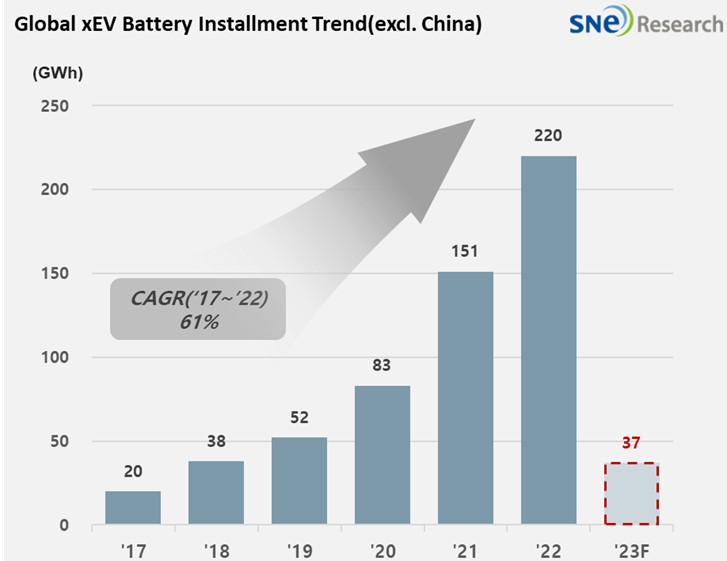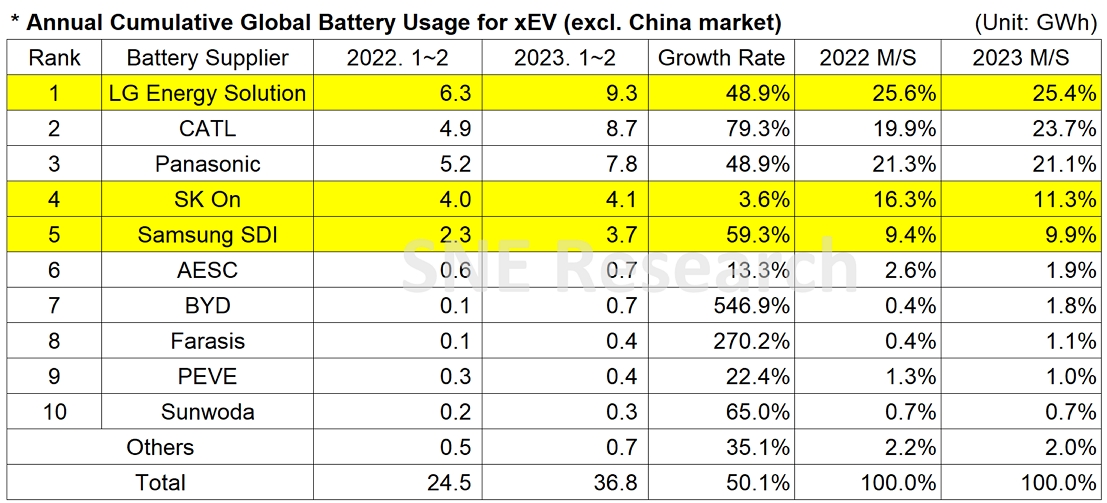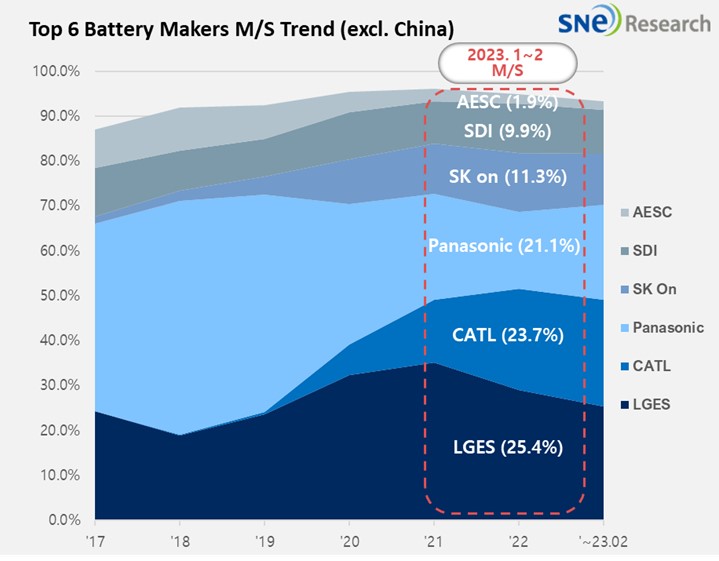From Jan to Feb 2023, Non-Chinese Global[1] EV Battery Usage[2]
Posted 36.8GWh, a 50.1% YoY Growth
- The K-trio recorded 46.6% M/S combined, with LGES Staying on Top
Battery
installation for global electric vehicles (EV, PHEV, HEV) excluding the Chinese
market sold from January to February 2023 was approximately 36.8GWh, a 50.1% YoY
growth.

(Source: Global Monthly EV & Battery
Forecast – March 2023, SNE Research)
In the
ranking of battery usage for electric vehicles, the three Korean battery makers
all safely landed in top 5 on the list. LG Energy Solution kept No.1 position
with a 48.9% YoY growth (9.3GWh), while SK-On ranked 4th with a 3.6%
YoY Growth (4.1GWh) and Samsung SDI ranked 5th with a 59.3% (3.7GWh)
YoY Growth. CATL jumped to the 2nd place on the list, recording a
double-digit growth rate of 79.3%(8.7GWh) even in the non-Chinese market.

(Source:
Global EV and Battery Monthly Tracker – March 2023, SNE Research)
Although
the combined market shares of the K-trio recorded 46.6%, a 4.7% decline from
the previous year, the total usage of their battery was found to be in an
upward trend. Their growth trend was mainly affected by
strong sales of electric vehicle models equipped with batteries of each
company. LG Energy Solution continued to grow thanks to the increasing
sales of Tesla Model 3/Y, Volkswagen ID.3/4, and Ford Mustang Mach-E. SK-On
boasted a high growth propped up with a huge popularity of Hyundai IONIQ 5 and KIA EV6 in the global market.
Samsung SDI also kept its growth momentum based on the favorable sales of BMW
i4, iX, Audi E-Tron line-up, and Rivian R1T/S.
Panasonic,
as one of the major battery suppliers to Tesla, continued to see a double-digit
growth which was mainly led by the sales of Toyota BZ4X and Tesla in the North
American market.
Together
with CATL, some of the Chinese companies have also enjoyed a high growth in the
non-Chinese market, expanding their global market shares beyond the domestic
market in China. CATL took the 2nd place on the list based on strong
sales of Tesla Model 3 (made
in China and exported to Europe, North America, and Asia), Volvo C40/XC40 Recharge, Peugeot e-208/2008,
and MG ZS. As it has been known that CATL’s battery may be installed to a new
KONA model made by Hyundai, it is expected that CATL would further strengthen
its presence in the non-Chinese market. BYD, boasting the highest growth among
the top 10 companies, has enjoyed a great popularity in the domestic market of
China based on its price competitiveness gained from the establishment of vertical,
integrate supply chain management such as in-house battery supply and vehicle
manufacturing. Strongly equipped with its price competitiveness targeting the
Chinese domestic market as well as quite-decently-established product quality,
BYD is expected to see a rapid growth in its market share even in Europe and
Asia. Farasis has also continued a
steady growth in 2023 thanks to the favorable sales of Mercedes EQ line-up,
exported to Europe, which is highly sought after in the global market.

(Source:
Global EV and Battery Monthly Tracker – March 2023, SNE Research)
Following
2022, LG Energy Solution maintained No. 1 position in the non-Chinese market in
the early 2023, but continuous high growth of CATL has posed a threat to the
Korean battery maker. As the US Inflation Reduction Act (IRA) has been enacted
to reduce the dependence on China regarding key battery materials, frankly
speaking, the K-trio might be expected to be benefitting from the Act. However,
amidst detour methods cleverly taken by the Chinese companies like joint
investment projects and another looming unfavorable factor, CRMA in Europe, attentions
should be paid to how the global market shares of K-trio would change down the
road.
[2] Based on battery installation for xEV registered during the relevant period.

